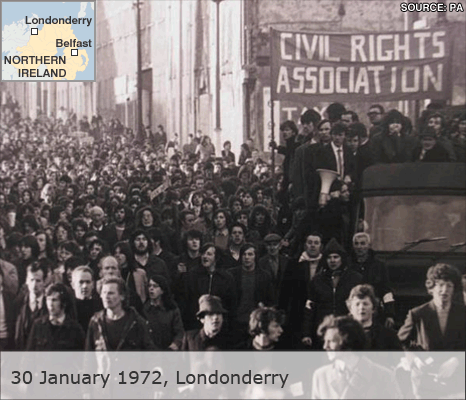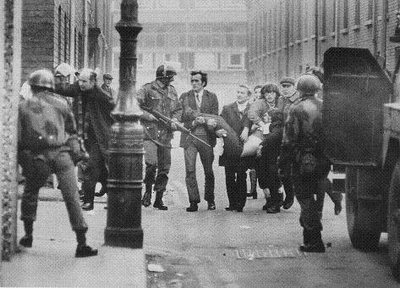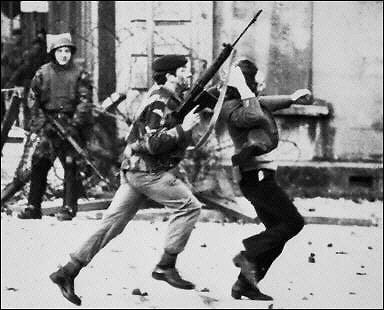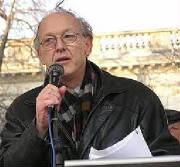Almost forty years later: The 5000 page Saville Commission Report into the
1972 Bloody Sunday massacre in Derry, Northern Ireland, while calling for compensation to the victims' families, fails to
identify who were the perpetrators, both within H.M government and the British Army.
"The North's Public Prosecution Service (PPS) is continuing to scrutinise
the Saville report to determine whether there is sufficient evidence to bring charges against British soldiers involved in
Bloody Sunday on January 30th, 1972. While progress has been made on the issue of compensation there have been no substantial
developments in relation to the possibility of British soldiers being charged. The PPS confirmed yesterday that the 5,000-page
report by Lord Saville into Bloody Sunday remains under examination but that it is not yet in a position to rule on whether
or not criminal cases can be taken against British soldiers involved in the shootings over 39 years ago." (Irish Times, September
22, 2011)
The payment of compensation is intended to whitewash Her Majesty's government.
Were these spontaneous killings or were members of the First Battalion of the
Parachute Regiment obeying orders from higher up?



https://www.youtube.com/watch?v=KY0sgIbSBwA&feature=player_embedded
While the possibility of bringing criminal charges against British soldiers
has been raised, the broader issue of "Who" within the British military and intelligence apparatus ordered the 1972
killings in Derry has never been addressed.
What was the underlying command structure of the First Battalion of the Parachute
Regiment which carried out the massacre?
General Sir Robert Ford was the Commander of Land Forces in Northern
Ireland in 1972. The First Battalion of the Parachute Regiment was under his jurisdiction.
Lieutenant Coronel Derek Wilford was commander of the First Battalion
of the Parachute Regiment (1 PARA), which constituted an elite special force unit of the British Army.
Wilford described by the BBC as "a well-respected high-flying officer"
was exonerated by the 1972 Widgery Tribunal.
While attention has been placed on the role of Lieutenant Colonel Derek Wilford, the
role of his adjutant, Captain Michael Jackson (who at the time had links to the Army's Intelligence Corps) has been
obfuscated since the outset of the investigation in 1972. Jackson was allegedly also instrumental in the cover-up.
Captain Michael Jackson was second in command (Adjutant) of the First Battalion of the Parachute
Regiment. He started his military career in 1963 with the Intelligence Corps. The Int Corps is a unit of military intelligence
and counter-intelligence attached to the British Army, which played a key role in Northern Ireland. The so-called "14 Intelligence
Company" also referred to as "14 INT" or 'The Det" "was a British Army special forces unit, established during the Troubles,
which carried out surveillance operations in Northern Ireland". ( http://www.eliteukforces.info/the-det/).

General Sir Michael Jackson
Under the orders of Lieutenant Coronel Derek Wilford, Captain
Michael Jackson and thirteen other soldiers of the parachute regiment opened fire "on a peaceful protest by the Northern Ireland
civil rights association opposing discrimination against Catholics. In just 30 minutes, 13 people were shot dead and a further
13 injured. Those who died were killed by a single bullet to the head or body, indicating that they had been deliberately
targeted. No weapons were found on any of the deceased." (Julie Hyland, "Head of NATO Force in Kosovo was Second-in-command
at "Bloody Sunday" Massacre in Ireland", World Socialist Website, 19 June 1999).
Both Wilford and Jackson were rewarded rather than prosecuted for their role in the 1972
massacre.
Wilford, who subsequently retired from the Armed Services, was awarded the Order of the
British Empire by H.M. Government in October of 1972, less than a year following the January 1972 massacre.
Michael Jackson's role in Bloody Sunday did not hinder his military career. In fact quite
the opposite. He ascended to the highest rank of the British military, before retiring in 2006 from the rank of Commander
of the General Staff (CGS).
In 1982 he became Commander of the 1st Battalion of the Parachute Regiment, and Brigade
Commander in Northern Ireland in the early 1990s.
From his stint in Northern Ireland, he was reassigned under United Nations auspices to the
theatre of ethnic warfare, first in Bosnia and Croatia and then in Kosovo.
In the immediate wake of the 1995 ethnic massacres in the Krajina region of Croatia largely
inhabited by Serbs, General Michael Jackson was put in charge as IFOR commander, for organising the return of Serbs "to lands
taken by Croatian HVO forces in the 1995 Krajina offensive". (Jane Defense Weekly, Vol 23, No. 7, 14 February 1996).
And in this capacity Jackson "urged that the resettlement [of Krajina Serbs] not [be] rushed
to avoid tension [with the Croatians]" while also warning returning Serbs "of the extent of the [land] mine threat."(Ibid)
Following his stint in Bosnia Herzegovina and Croatia, Lieutenant General
Mike Jackson led the June 1999 land invasion of Yugoslavia and was posted to Kosovo as KFOR Commander.
In Croatia, Bosnia and Kosovo, General Michael Jackson applied the counter-insurgency
skills acquired in Northern Ireland. In Kosovo he actively collaborated with the Kosovo Liberation Army (KLA) headed by Commander
Agim Ceku.
Ceku and Jackson had worked together in Croatia in the mid-1990s. Agim Ceku
was Commander of the Croatian forces which conducted the Krajina massacre under "Operation Storm". Meanwhile, Jackson
was responsible for the repatriation of Krajina Serbs, under UN auspices.
In turn, Military Professional Resources
Inc (MPRI), a mercenary outfit on contract to the Pentagon was responsible for advising the Croatian HVO forces in the planning
of "Operation Storm". The same mercenary outfit was subsequently put in charge of the military training of the Kosovo Protection
Corps (KPC) largely integrated by former KLA operatives.

1999 War Criminals Join Hands (Kosovo 1999).
From Left to Right:
Hashim Thaci, Head of the Kosovo Liberation Army (KLA), with links to Al Qaeda
and Italian organized crime. Hashim Thaci had ordered political assassinations directed against the Party of Ibrahim Rugova.
Thaci was a protégé of Madeleine Albright.
Bernard Kouchner, Head of the United Nations Mission in Kosovo (UNMIK) in
Kosovo (July 1999- January 2001), instrumental in elevating the KLA to UN status through the formation of the Kosovo Protection
Corps (KPC).
General Michael Jackson, Commander of KFOR Troops in Kosovo.
General Agim Ceku, Military Commander of the KLA and the KPC, investigated
by the International Criminal Tribunal for the former Yugoslavia (ICTY) "for alleged war crimes committed against ethnic Serbs
in Croatia between 1993 and 1995." ( AFP 13 Oct 1999)
General Wesley Clark, NATO Supreme Commander.
While General Michael Jackson during his tenure as KFOR Commander
in Kosovo (1999-2000) displayed token efforts to protect Serb and Roma civilians; those who fled Kosovo during his mandate
were not encouraged to return under UN protection. In post-war Kosovo, the massacres of civilians was carried out by the KLA
(and subsequently by the KPC). Both NATO and the UN turned a blind eye to the KLA's targeted assassinations.
Upon completing his term in Kosovo, General Sir Michael Jackson was appointed
Commander in Chief, U.K. Land Command (2000-2003).
And in February 2003, barely one month before the onslaught of the Iraq war,
he was promoted to Chief of the General Staff (CGS)
As Chief of General Staff General Michael Jackson played a central role in
the 2003 Iraq military campaign in close liaison with his US counterparts. He also played a key role in the military occupation
of Southern Iraq, led by British forces based in Basra.
"Bloody Monday", September 19, 2005 in Basra, Iraq
On Monday September 19, 2005, two British undercover "soldiers" dressed in
traditional Arab garb, were arrested by the Occupation's Iraqi police driving a car loaded with weapons, ammunition and
explosives. Several media reports and eyewitness accounts suggested that the SAS operatives were disguised as Al Qaeda
"terrorists" and were planning to set off the bombs in Basra's central square during a major religious event.
The two SAS soldiers were "rescued" by British forces in a major military
assault on the building where they were being detained:
"British forces used up to 10 tanks " supported by helicopters " to smash
through the walls of the jail and free the two British servicemen."
The incident resulted in 7 Iraqi deaths and 43 injured.
(The
Times, 20 Oct 2005 http://www.timesonline.co.uk/article/0,,7374-1788850,00.html)
"Compensation" to the Families of the Victims
Instead of investigating and prosecuting those responsible for the Basra massacre
led by British forces. the British government confirmed that it "will pay compensation for injuries and damage caused
during the storming by the army of a police station in Basra in the operation to release two SAS soldiers" (The Scotsman,
15 Oct 2005).
The wording was reminiscent of the Bloody Sunday massacre: no prosecution,
no investigation, no justice, but "compensation" as a cover-up to war crimes.
Captain Ken Masters of The Royal Military Police (RMP) in Basra had the mandate
to investigate the circumstances of the "rescue" operation. To this effect, he also indicated that he would cooperate in his
investigations, with the civilian Iraqi authorities.
The Royal Military Police (RMP) is the corps of the British
Army responsible for the policing of service personnel, both in the U.K. and overseas.
As part of his RMP mandate, Captain Masters was to investigate "allegations
that British soldiers killed or mistreated Iraqi civilians". Specifically in this case, the inquiry pertained to the British
attack on the prison on 19 September, where the 2 SAS soldiers were being detained. The attack had been authorized by CGS
General Sir Michael Jackson and British Defence Secretary John Reid.
"Compensation to the families of alleged Iraqi victims who died during
the fracas depended on the official investigation being carried out by Captain Masters [of the Royal Military Police in Basra]
and his team."
That investigation was never carried out. Captain Ken Masters of the
RMP allegedly "committed suicide" in Basra on the 15th of October 2005.
According to the MoD "the circumstances
[of his death ] were not regarded as suspicious." [emphasis added] The MoD report
suggested that Captain Masters was suffering from "stress", which could have driven him to commit suicide. In the words of
a Defense analyst quoted by the BBC:.
"Capt Masters was part of quite a small outfit and his job would have been
quite stressful. It's quite an onerous job..... I think, [there is] quite a lot of stress involved"
(BBC, 16 October 2005, emphasis added).
There were apparent disagreements between the MoD and Captain Masters who
was responsible for investigating "the actions and behavior of military personnel". (The Independent 17 Oct 2005).
The attack on the 19th of September to "rescue" the two SAS men was launched
under the command of Brig John Lorimer. In a statement, Lorimer said that the purpose of the raid was to ensure the safety
of the two SAS men.
On October 12, CGS General Sir Michael Jackson was in Basra for consultations
with Brigadier John Lorimer.
CGS General Michael Jackson, had previously approved the rescue operation
of the elite SAS men: "Let me make it clear that it was important to retrieve those two soldiers." (quoted in The Times,
12 Oct 2005).
Three days later, following General Jackson visit to Basra, Captain Master
was dead:
"Captain Ken Masters, the top British military police investigator working
in Iraq, was found hanged at his barracks in Basra [on October 15]."
No subsequent RMP investigation into the Basra "rescue" following Captain's
Masters untimely death was undertaken.
No police investigation was carried out into the unusual circumstances surrounding
the death of Captain Masters.
It was an open and closed case.
The matter passed virtually unnoticed
in the British media. Nonetheless, the Daily Mail (17 Oct 2005), dismissed the suicide thesis: "Little is known of his private
life and it is said to be unlikely that the pressures of work would have led him to commit suicide."
Apologizing for War Crimes
From Bloody Sunday in January 1972 in Derry, Northern Ireland to Croatia, Kosovo and Basra,
Iraq in September 2005.
Last year in June 2010, General Sir Michael Jackson "apologised for Bloody
Sunday" in a TV interview broadcast by the BBC.
(Click link to hear Jackson's statement http://news.bbc.co.uk/2/hi/uk_news/northern_ireland/8742373.stm )
"The former head of the British Army, General Sir Mike Jackson, has offered a ''fulsome
apology'' for the events of Bloody Sunday, following the publication of the Saville report into the events of 30 January 1972
in Londonderry. The findings called the fatal shootings of civilians by British soldiers a ''catastrophe'' for Northern Ireland.
Prime Minister David Cameron has said the killings of 13 marchers was ''unjustified and unjustifiable''.
http://news.bbc.co.uk/2/hi/uk_news/northern_ireland/8742373.stm
Prime Minister David Cameron said "He was "Sorry".
Apologizing for War Crimes? What are the legal implications? Indictment or "Self-indictment"?
By Prof. Michel Chossudovsky






